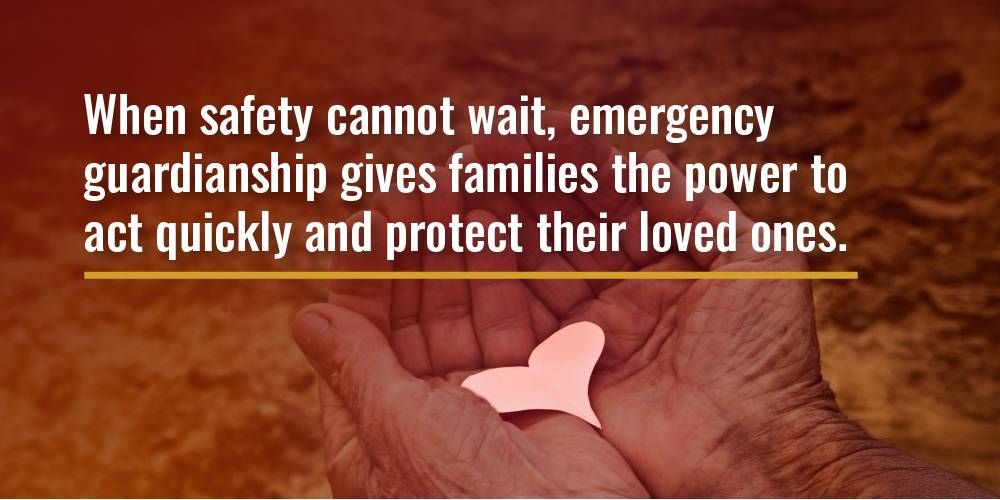 630-393-3111
630-393-3111
4200 Cantera Drive, Suite 200 | Warrenville, IL 60555
Emergency Guardianship of an Adult
 Adult guardianship is a court order that lets one adult make decisions about another person’s health, money, or property. This step is necessary when an individual who is 18 or older can no longer effectively manage their own affairs.
Adult guardianship is a court order that lets one adult make decisions about another person’s health, money, or property. This step is necessary when an individual who is 18 or older can no longer effectively manage their own affairs.
Guardianship proceedings can take months. To provide quick protection in urgent situations, courts sometimes grant temporary emergency guardianship. A knowledgeable DuPage County, IL adult guardianship attorney can help you navigate the process and protect your loved one’s interests.
Why File for an Emergency Guardianship?
Some adults with disabilities or impairments cannot protect themselves from harm or financial abuse. Emergency guardianship offers immediate protection when there is a real risk facing an individual or their property before a permanent guardian is appointed.
Under 755 ILCS 5/11a-3, a court can only appoint a guardian if it determines that a person is "disabled" because of mental decline, physical limits, or developmental disability. This ensures guardianship is only used when there is clear proof that the person cannot make sound decisions.
Courts may grant emergency guardianship for mental illness, aging, or developmental disabilities. It can also be ordered if unstable behavior or serious physical problems put the person or their property at risk. In each case, the court focuses on the best interests of the individual, prioritizing their safety and well-being.
How is an Emergency Guardian Appointed?
According to 755 ILCS 5/11a-4, if the situation is urgent, a judge can appoint an emergency guardian right away without needing the usual notice. Typically, they will review a petition with the supporting documents and a doctor’s report before making their decision. Once appointed, a guardian can act on behalf of the incapacitated individual. The guardian stays in charge until the order ends or a new guardian is chosen.
To be a guardian, you must meet the following criteria:
-
Be at least 18 years of age
-
Be a U.S. resident
-
Be of sound mind
-
Not be disabled
-
Not have been convicted of a felony that involved harm to a child, the elderly, or someone with a disability. The court considers other reasons for a felony conviction on a case-by-case basis.
Alternatives to Emergency Guardianship in Illinois
Emergency guardianship can be important, but Illinois law asks courts and families to look at less restrictive choices first. The goal is to protect vulnerable adults while letting them keep as much independence as possible.
One option is a power of attorney (POA). If the adult signed a POA before becoming incapacitated, the chosen agent may already have the power to make medical or financial decisions, so guardianship might not be needed.
Another option is a supported decision-making agreement. This lets the adult keep making their own choices with help from trusted supporters. It is often useful for people with mild intellectual or developmental disabilities.
Courts usually grant emergency guardianship only if these options are not enough to prevent harm. Knowing the alternatives helps families protect their loved one while also respecting their independence.
The Role of Medical Evidence in Emergency Guardianship Cases
Medical evidence often plays a decisive role in whether a court grants emergency guardianship. Judges rely heavily on physicians’ reports, psychological evaluations, or hospital records to determine whether an individual is truly incapable of making safe and responsible decisions. A doctor’s affidavit may outline the person’s diagnosis, level of impairment, and the risks they face without immediate protection. In some cases, testimony from healthcare providers is also requested to support the petition.
Because the standard under 755 ILCS 5/11a-3 requires proof of disability or incapacity, families must be prepared to gather accurate and timely documentation. Submitting incomplete or outdated records can delay the process, and that can be a major issue when protection is needed. By working with an attorney, you can make sure the right medical professionals are consulted and that the evidence you present to the court clearly shows why emergency guardianship is necessary.

What Rights Does an Emergency Guardian Have in Illinois?
An emergency guardian’s authority depends on the scope of the court order. Some may have control over health and personal care decisions, while others may manage finances and property. Courts generally limit this authority to what is strictly necessary to protect the adult during the emergency period.
Under 755 ILCS 5/11a-17, you, as a guardian, have the duty to provide for your ward’s support, care, comfort, health, education, and maintenance. For example, you may:
-
Authorize medical treatment and arrange necessary care.
-
Pay urgent bills or protect assets from financial exploitation.
-
Make temporary living arrangements to ensure your ward’s safety.
-
Prevent others from getting access to or harming the vulnerable adult.
Your goal would be to preserve your ward’s autonomy as much as possible. Misusing this authority can cause the court to remove you as guardian and may even result in legal penalties.
How Long Does an Emergency Guardianship Last in Illinois?
Emergency guardianships are temporary. In Illinois, they generally last no longer than 60 days, unless extended by the court for compelling reasons. During this time, the court may hold more hearings to decide if permanent guardianship is needed or if the person can manage on their own again.
The process moves quickly and the rules for emergency guardianship can be complicated. Proof like medical records, witnesses, or financial papers can be crucial for changing an emergency guardianship into a permanent one. Having legal guidance ensures you meet deadlines and protect your loved one’s rights.
Contact a Naperville, IL Adult Guardianship Attorney Today
Adults with disabilities or serious health issues may need protection from others or from unsafe choices they might make. A knowledgeable DuPage County, IL guardianship lawyer can guide you through the process of petitioning for emergency guardianship when immediate action is required.
Attorney Michael J. Calabrese, a former chair of the DuPage County Bar Association Family Law Committee, also lectures on family law issues, bringing valuable insight and experience to every case. At Calabrese Associates, P.C., we understand the importance of safeguarding those who cannot protect themselves. Call us today at 630-393-3111 to schedule a consultation and learn how we can help.


 4200 Cantera Drive, Suite 200, Warrenville, IL 60555
4200 Cantera Drive, Suite 200, Warrenville, IL 60555 630-393-3111
630-393-3111





